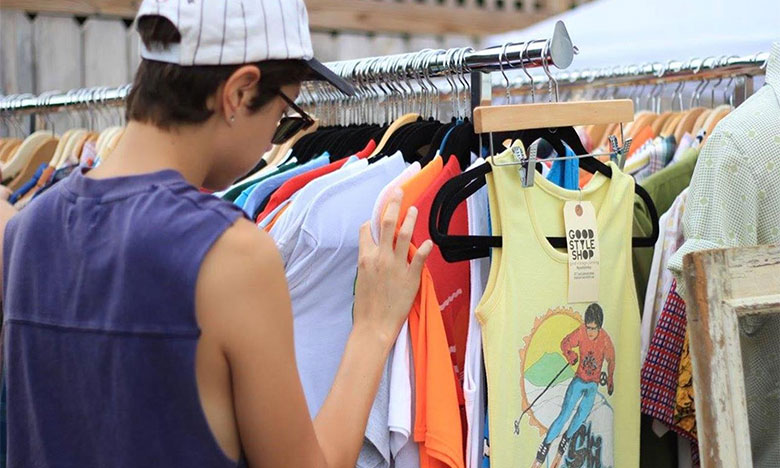Pete Benck’s Instagram account wasn’t always all business. When he first started posting on the photo-sharing app, he shared the usual candids, selfies and personal inspiration. Aside from the occasional event flyer or shop-window shot, there was little to suggest that he owned a vintage clothing store in Madison, Wisconsin, called the Good Style Shop.
When Benck started noticing that vintage shops in New York and Los Angeles were using Instagram as a free e-commerce and promotional tool, he quickly “industrialized” his own shop’s account, complete with a paid online content producer. Now, six years after Benck bought the struggling store for $11,000, business finally is booming. “My Instagram account became a mouthpiece — a megaphone, really — for the shop,” Benck says. “Like, ‘Hey, we exist!’”
At a time when established mall-based retailers like J.Crew and Abercrombie & Fitch suffer from declining sales, the used/resale apparel market is growing. According to a 2016 report from the online resale giant ThredUP, high-quality resale is one of the fastest-growing sectors in retail; the market is expected to grow from $14 billion in 2015 to $25 billion in 2025.
Benck and his team of vintage consignors obviously are a small part of that growth, but the Good Style Shop is one example of how a brick-and-mortar retailer in flyover country can flourish by tapping into broader market trends and new technology. In 2016, the Good Style Shop recorded $250,000 in sales, up 20 percent from 2015, and Benck attributes that success to a hybrid business approach that the 29-year-old Iowa native calls his four legs: in-person purchases at his physical shop; online sales through Instagram; wholesaling heartland-harvested vintage clothing to buyers on the coasts; and out-of-store events like the Midwest Vintage Flea, a resale summit that Benck founded last year.
Roy DeYoung, senior vice president of creative strategy at PMX Agency, a marketing concern based in New York, sees the trend as a connection between the growing demand for used clothing and personal brand building via storytelling apps like Instagram and Snapchat, especially for younger consumers. He calls it “out-of-house social.” DeYoung, who also happens to have a passion for vintage, adds: “They’re going to bargain shops. They’re going to end up on Instagram. It’s not just the purchase. It’s the journey of the purchase and the story behind the piece. Do I think that they’re going to build entire wardrobes out of vintage? No, but they’re going to have select pieces that will be part of their personal story, which is their art.”
Benck also credits the shop’s success to its cooperative operation model. The Good Style Shop is set up as an LLC with Benck as the sole proprietor, but he employs five “member sellers” who scour the hinterlands for product and staff the retail space one day per week. Rebecca Light, the shop’s most prolific and longest-serving consignor, sold independently online and at pop-ups prior to joining Benck. She says she welcomed the opportunity to come in from the cold, even if it came with a cost. “I know I could put a lot of the stuff on Etsy or eBay and probably sell it for more money than I can get here in the shop,” Light says. “But the shop gives me camaraderie and community. I get to see people face-to-face when they’re buying my stuff, and I get to see people wearing it around town.”
That sentiment is echoed by Kareena Sheely and Hanna Compton, the owners of Prairie La Crosse, a brick-and-mortar vintage shop in La Crosse, Wisconsin. Both women hail from Southern California, and both sold through Etsy before moving to the Midwest in 2012 and 2015, respectively. After discovering how cheaply they could rent in downtown La Crosse — they currently pay $350 per month — the pair took over a vacant retail space on Main Street, just a few blocks from the Mississippi River. “We wanted to bring something new to the area,” Sheely says. “There wasn’t anything like this here.”
Sheely and Compton readily admit the foot traffic in downtown La Crosse does not pay the bills. Much like the Good Style Shop, they’ve embraced a hybrid business model — one centered around selling through Instagram and taking their show on the road. This winter, for example, at a time when in-store visits were nonexistent, Sheely and Compton packed their shop into a 2010 Honda Odyssey and headed home to sell at vintage markets in Southern California. Last summer they also participated in Benck’s Midwest Vintage Flea and peddled their wares at a market associated with Eaux Claires, a music festival produced by Justin Vernon of Bon Iver fame.
The brick-and-mortar location in La Crosse, it turns out, is more useful for other purposes than retail sales. The co-owners use the shop as a photo studio where they shoot all the items that end up on Prairie La Crosse’s Instagram account and as a warehouse. “Honestly, this is like storage for our online store,” Compton says, “instead of having all this stuff in our apartments.”
Shortly after opening, though, they learned there was an unexpected benefit to having a physical shop in the heartland: “Most of our good supply connections have come from having a storefront,” Compton says. “We would not have them if we just sold online. Because we get random old ladies coming in here and saying, ‘I have a huge collection of stuff I want to get rid of. Will you come look at it?’”

